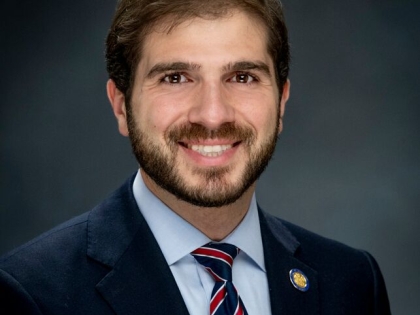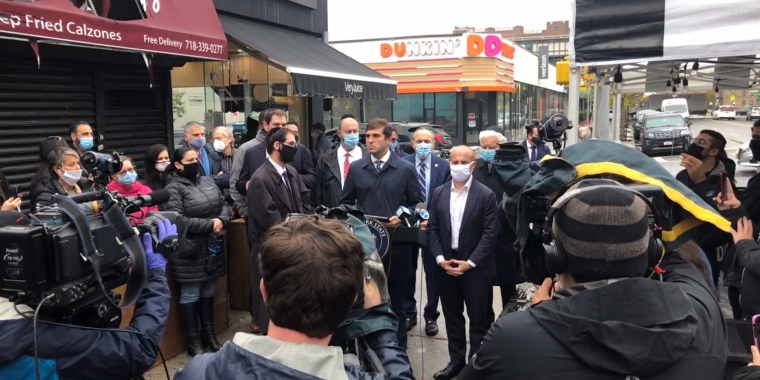
Sen. Gounardes Joins New ‘Rider Representation Coalition’ to Rally for Voting Rights for Riders on the MTA Board
March 21, 2024
-
ISSUE:
- Public Transit

FOR IMMEDIATE RELEASE: MARCH 20, 2024
View video of Senator Gounardes' remarks here.
Albany, NY - New York State Senator Andrew Gounardes and Assemblymember Jeffrey Dinowitz joined riders, advocates and other lawmakers to launch the Rider Representation Coalition, and call for the passage of legislation that would grant voting rights to rider representatives on the MTA Board of Directors.
Rider representatives on the board—including those representing the New York City Transit Authority Advisory Council, the Metro-North Rail Commuter Council, and the Long Island Rail Road Commuter Council—currently don't have voting rights. Despite being the only MTA board members required by law to ride the transit system they represent, they can’t make motions, chair committees, or use their votes as leverage to secure policy victories for riders.
The Rider Representation Act (S20A/A923A) would grant voting membership to the three rider representatives, and create a new, independent seat to represent riders with disabilities. The Rider Representation Coalition is made up of transit riders and advocates from across the MTA service region.
As the MTA prepares in the coming year to vote on major changes, including crafting the next multibillion-dollar Capital Program, advancing new fare proposals, getting congestion pricing over the finish line, and working towards full transit access for riders with disabilities, the group called on the legislature to pass the legislation to give riders a true say in the issues that impact their lives.
"Riders have the most at stake when it comes to the MTA’s decisions, but they don’t get a vote on the board that makes those decisions happen," said State Senator Andrew Gounardes. "Millions of riders rely on MTA’s trains and buses daily to get to work, to school, to the doctor, and to everywhere else, and they deserve a real say in the decisions that impact their lives. My Rider Representation Act would do that by giving rider representatives a vote on the MTA Board and by creating a new, independent seat to represent riders with disabilities. With the MTA preparing to shape its next capital plan, implement congestion pricing, and work toward true accessibility, the time is now to give riders a vote."
Assemblyman Jeffrey Dinowitz said: "The MTA must grant riders voting rights on its board, as proposed in the Rider Representation Act, A.923-A/S.20-A. This act extends voting privileges to the NYC Transit Riders Council, LIRR Commuter Council, and Metro-North Commuter Council representatives. It suggests a voting board member from the Mayor's Office of People with Disabilities. This move is essential for ensuring meaningful representation, particularly for riders with disabilities, during critical MTA projects. Recent board meetings have highlighted the urgent need for such legislation, as insufficient voting members have been present while non-voting members attended. Enacting this law would enable the MTA board to effectively steer policies and procedures for the entire transit system, bridging the gap between voice and vote and ensuring all stakeholders have a say in its future."
“For too many years, the rider representatives on the MTA Board have had to literally sit on their hands when major decisions about fares, projects and billions of dollars in contracts have come up for a vote,” said Lisa Daglian, Executive Director of the Permanent Citizens Advisory Committee to the MTA (PCAC). They haven’t been able to chair committees or take action on the very things that will have a direct effect on the riders they represent on subways, buses, the LIRR, Metro-North and the Staten Island Railway. It’s time to put riders in the driver’s seat and finally give them a vote on the MTA Board to go along with the hands-on experience they get as the only members required to ride transit. And providing a new, independent seat for a disability advocate will help ensure that all of New York’s communities have a vote in the future of the system that moves our region.”
"Every rider deserves a voice that counts. The Rider Representation Act isn't just about votes; it's about ensuring that those who rely on our transit systems have a direct say in their operation. This piece of legislation isn't just overdue; it's a critical step towards a more inclusive and effective MTA board - where every voice counts, truly reflecting those it serves," said Senator Robert Jackson.
Senator Brad Hoylman-Sigal said: “I’m proud to co-sponsor the Rider Representation Act to give the representatives elected by the New York City Transit Riders Council, the Long Island Rail Road Commuter Council, and the Metro-North Railroad Commuter Council full voting power on the MTA board, as well as create a much needed additional voting member to represent riders with disabilities. I’m hopeful that we can pass the Rider Representation Act this year and help transform the MTA board into one that is more representative and responsive to our local communities.”
Senator Pete Harckham said: "We are lucky that we have such a vast public transit system that connects much of our area and transports millions of people each day. That is why it is so important that we ensure that the voices of representatives of these commuters be clearly heard on the Board of the Metropolitan Transportation Authority and that they have a solid influence on its transit policies."
Senator Shelley B. Mayer said: “All New Yorkers deserve to have their voice heard as the MTA determines how to best serve our communities. I am proud to support this legislation to ensure riders on Metro-North, users of other transit systems, and riders with disabilities, all have designated voting representatives on the MTA Board.”
“The Rider Representation Act marks an important step forward in ensuring that New York’s public transportation meets the needs of its passengers,” said Senator Nathalia Fernandez. “It’s critical that rider representatives on the MTA board have the right to vote, not just the opportunity to speak. This is about bringing the lived experiences of daily commuters into the MTA’s decision-making process. By doing so, it will make the MTA more responsive, inclusive, and accountable."
"As someone who served as a rider representative on the New York City Transit Riders Council, I know how vital the voices and experiences of riders are to shaping policy and improving the MTA system. The Rider Representation Act is an important action toward elevating the voices and needs of the diverse New York public transit riders. In order to serve the people, the MTA Board should reflect the people using the services. As a public transit rider, I believe ensuring that New Yorkers are represented on the MTA Board in the decision making process is an integral aspect to our progress as a state and is a step toward equity. I'm ready to vote in favor of passing the Rider Representation Act now," said Assemblymember Jessica González-Rojas.
"Riders are the most important stakeholder in every MTA decision—they deserve a vote on the board. And as the MTA pushes ahead on its ambitious capital plan, it's essential that the disability is at the table too. That's why I'm proud to support the Rider Representation Act. Let's get it done," said Assemblymember Emily Gallagher.
"The MTA board makes countless decisions that have consequences for transit riders, and yet riders don't have voting representation on the board," said Assemblymember Tony Simone. "This legislation fixes that. The Rider Representation Act will give riders true representation on the board, and give transit riders more agency in decisions like fare increases, capital project priorities, accessibility improvements, and more. Riders must have a voice when these critical decisions are being made, and this legislation ensures that not only are they at the table, but they have a vote as well."
"The Metropolitan Transportation Authority serves more than 15 million residents throughout the downstate area, yet people with disabilities and riders who live outside the five boroughs and travel into the City on MTA transportation have not been given a seat at the table," said Assemblymember Linda B. Rosenthal (D/WF - Manhattan), Chair of the Assembly Committee on Housing. "To strengthen our public transportation system and ensure it works for everyone, it is critical that those who ride the Long Island Rail Road, Metro-North and paratransit are able to vote and fully participate on the MTA Board. I am proud to co-sponsor the Rider Representation Act and look forward to partnering with my colleagues and this coalition to pass the bill into law and ensure the voices of all who rely on the MTA are heard."
“The millions of New Yorkers who rely on the MTA deserve a seat at the table. The Rider Representation Act is a long overdue reform that will empower transit riders to have a say in the MTA’s decision-making process. As a lifelong resident of Flatbush, where so many of my neighbors need affordable and reliable public transit, I am proud to co-sponsor legislation that ensures the MTA board reflects our communities’ needs,” said Assemblymember Brian A. Cunningham.
“No one knows public transit better than the people who use it daily. Riders deserve a vote on the MTA board because those decisions affect them and how they mobilize themselves. Without representation their voices are silenced when they deserve a seat at the table,” said Assemblymember George Alvarez.
“For our public transit system to be truly public, it must reflect the community it serves,” said Assemblymember Grace Lee. “The MTA is mainly funded through tax dollars, and with the implementation of congestion pricing, the average New Yorker’s contributions to its programs will be increasing. The public deserves a voice in how this money is spent, particularly so we can ensure the MTA is building a more accessible and equitable transit system. I am proud to join PCAC in fighting for the inclusion of the Rider Representation Act in this year’s budget.”
"Riders deserve representatives on the MTA board who have voting power, since they are the ones who regularly use the system. Riders with disabilities also deserve a vote to help hold the MTA accountable to the community that has historically been underrepresented throughout the agency and its governing body," said Jessica Murray of the Rise and Resist Elevator Action Group.
"Bus and subway riders have the biggest stake in public transit policy and we deserve meaningful seats at the table where decisions are hashed out," said Riders Alliance Deputy Director Caitlin Pearce. "Riders Alliance is excited to be a part of the Rider Representation Coalition and win the fast, frequent, accessible, affordable, reliable, and resilient transit service we need. Thanks to our colleagues at the Permanent Citizens Advisory Committee to the MTA (PCAC) for championing the issue and Senator Gounardes and Assemblymember Dinowitz for their leadership as sponsors of the legislation."
"The need for rider representation on the MTA Board has never been more urgent, particularly as the MTA plans for its next capital plan," said Jaqi Cohen, Director of Climate and Equity Policy at Tri-State Transportation Campaign. "Without a vote, rider representatives on the MTA board lack the leverage needed to ensure policies are implemented that best serves millions of subway, bus, commuter rail, and Access-A-Ride riders. Passing the Rider Representation Act is essential to ensure that riders have a say in these crucial decisions."
"NYPIRG strongly supports passing the Rider’s Representation Act to ensure that more riders have a voice that counts on the MTA’s board," said Cecilia Ellis, NYPIRG Straphangers Campaign Coordinator. "This pivotal legislation will ensure the board is reflective of the needs of the millions of Straphangers who use public transportation in New York City every day."
Media Contact:
Billy Richling
Communications Director
State Senator Andrew Gounardes
billy@senatorgounardes.nyc
###
related legislation
Share this Article or Press Release
Newsroom
Go to NewsroomJohn Cortese
November 11, 2020

Statement on Continued Public School Closures
November 5, 2020
